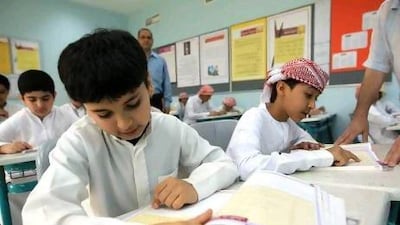ABU DHABI // Standards have risen and more young Emiratis are passing their final school exam - but too many still leave school with no qualifications.
That is the verdict of education experts after the first decade of the Common Educational Proficiency Exam (Cepa), which began in 2003 and which Emirati teenagers take in their last year of state high school to qualify for entry to federal universities.
Ryan Gjovig, head of Cepa, said the results showed "a huge increase in the number and quality of candidates available for the three federal institutions in the past 10 years".
Since 2003, the number taking the exam has risen from 14,015 to 17,593, but that is due to the increase in population. The proportion has barely moved, from about 61 per cent a decade ago to 57 per cent today, although both figures are based on unreliable population estimates. Two in five Emiratis still leave school without a qualification.
Youmna Badowah, head of the National Admissions and Placement Office (Napo), which manages university admissions, said: "For those who are not Napo applicants, we don't have any way to know what becomes of them."
Ms Badowah guessed that a large number of the young men end up working for the military or the police. Many uniformed jobs require no more than high-school education.
Of those who do sit Cepa, girls have consistently done better than boys. In 2003, their average score was 152 out of 210 - a score of 150 is now a minimum entry requirement for federal university - while boys' average score was 146. By this year, those averages had risen to 163 for girls and 158 for boys.
This imbalance, while not unique to the UAE, "needs to be looked at closely to determine why this pattern is emerging and what can be done to make higher education a more attractive proposition to males", said Ms Badowah.
Men make up just a third of federal university students, with many opting for either work or study overseas.
There has been solid improvement in overall results in the past decade. In 2003, 45 per cent failed to make even the basic 150 pass mark. Now only 23 per cent fail.
And the number scoring more than 180 - the minimum needed to go straight on to a degree course without remedial English lessons - has soared to 16 per cent from just 3 per cent in 2003.
Nevertheless, that leaves a majority - 61 per cent - in limbo, with a score that gets them into university, but not on to a degree course.
Instead, they take remedial courses - usually for two or three years - to try to bring their English up to the level needed.
Officials have been desperately trying to bring down the remedial numbers for years - it is the main purpose of Abu Dhabi's bilingual New School Model - but they have stayed stubbornly high, draining an estimated 30 per cent of the federal higher education budget.
Part of the problem is that for many, 18 may be too late to learn a second language. A study at HCT last year found that a quarter of remedial English students showed little improvement in the language over the course of a year.
Mr Gjovig said there are limits to how much older language-learners can improve. "At this age it will be a little slower than if we do it more intensely at a younger age," he said.
But it will be a long time before schools' Cepa results are good enough for foundation courses not to be needed. Mr Gjovig says they will "continue to be necessary in the foreseeable future", much like "a shadow high school".
Ms Badowah agrees. "When the large majority of our candidates achieve high marks on the Cepa exams … then we should have the discussion about phasing out foundation programmes."

